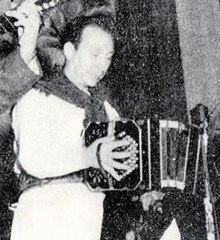Tránsito Cocomarola: Difference between revisions
Fixing. |
m Dating maintenance tags: {{Notability}} {{Inline}} |
||
| (9 intermediate revisions by 3 users not shown) | |||
| Line 1: | Line 1: | ||
{{Short description|Argentine musician and folklorist}} |
{{Short description|Argentine musician and folklorist}} |
||
{{ |
{{Inline|date=June 2024}} |
||
{{Notability|date=June 2024}} |
|||
[[File:Tránsito Cocomarola - 1950.jpg|thumb|Tránsito Cocomarola]] |
[[File:Tránsito Cocomarola - 1950.jpg|thumb|Tránsito Cocomarola]] |
||
'''Mario del Tránsito Cocomarola''' ([[San Cosme, Corrientes]], August 15, 1918 – September 19, 1974) was an [[Argentine people|Argentine]] musician and folklorist, and is known as one of the most influential figures of [[chamamé]]. |
|||
His repertoire of about 400 compositions included some classics such as "Kilometro 11", "Puente Pexoa", and "Rincón dichoso" y "Retorno". |
'''Mario del Tránsito Cocomarola''' ([[San Cosme, Corrientes]], 15 August 1918 – 19 September 1974) was an [[Argentine people|Argentine]] musician and folklorist, and is known as one of the most influential figures of [[chamamé]]. His repertoire of about 400 compositions included some classics such as "Kilometro 11", "Puente Pexoa", and "Rincón dichoso" y "Retorno". |
||
In the 1930s and 1940s he joined several musical ensembles, such as "Los hijos de Corrientes", el "Trío típico Correntino", "Los Kunumí", and the "Trío Taragüí". In 1942 he recorded his first album in the Odeon, which would later kick start a solo career that lasted until the year of his death. He played alongside |
In the 1930s and 1940s he joined several musical ensembles, such as "Los hijos de Corrientes", el "Trío típico Correntino", "Los Kunumí", and the "Trío Taragüí". In 1942 he recorded his first album in the Odeon, which would later kick start a solo career that lasted until the year of his death. He played alongside many great figures of the genre. |
||
After a complication during a [[gall bladder]] operation, he died on September |
After a complication during a [[gall bladder]] operation, he died on 19 September 1974, aged 56. |
||
In Corrientes, the Provincial Act No. 3278 established that date as the "Chamamé Day." He was posthumously named "Illustrious Citizen of the City of Corrientes". |
|||
==References== |
==References== |
||
{{reflist}} |
{{reflist}} |
||
==Links== |
|||
* [https://web.archive.org/web/20080110072905/http://www.siemprechamame.com.ar/Mario-del-Transito-Cocomarola.html Biografía Completa del cantautor] |
|||
* [http://www.fundacionmemoriadelchamame.com/biografia/32/ Biografía], Fundacionmemoriadelchamame.com |
|||
* [https://www.discogs.com/es/artist/1799050-Tr%C3%A1nsito-Cocomarola Discografía de Tránsito Cocomarola], discogs.com |
|||
{{authority control}} |
{{authority control}} |
||
{{DEFAULTSORT: |
{{DEFAULTSORT:Cocomarola, Transito}} |
||
[[Category:1918 births]] |
[[Category:1918 births]] |
||
[[Category:1974 deaths]] |
[[Category:1974 deaths]] |
||
[[Category: |
[[Category:Argentine male composers]] |
||
[[Category:Argentine |
[[Category:Argentine male songwriters]] |
||
[[Category:Argentine songwriters]] |
|||
[[Category:Argentine male writers]] |
|||
[[Category:People from Corrientes Province]] |
[[Category:People from Corrientes Province]] |
||
[[Category: |
[[Category:20th-century Argentine male musicians]] |
||
[[Category:20th-century Argentine |
[[Category:20th-century Argentine songwriters]] |
||
[[Category:20th-century |
[[Category:20th-century Argentine composers]] |
||
[[Category:Deaths from surgical complications]] |
|||
{{Argentina-composer-stub}} |
{{Argentina-composer-stub}} |
||
Latest revision as of 17:00, 19 June 2024
This article includes a list of references, related reading, or external links, but its sources remain unclear because it lacks inline citations. (June 2024) |
The topic of this article may not meet Wikipedia's general notability guideline. (June 2024) |

Mario del Tránsito Cocomarola (San Cosme, Corrientes, 15 August 1918 – 19 September 1974) was an Argentine musician and folklorist, and is known as one of the most influential figures of chamamé. His repertoire of about 400 compositions included some classics such as "Kilometro 11", "Puente Pexoa", and "Rincón dichoso" y "Retorno".
In the 1930s and 1940s he joined several musical ensembles, such as "Los hijos de Corrientes", el "Trío típico Correntino", "Los Kunumí", and the "Trío Taragüí". In 1942 he recorded his first album in the Odeon, which would later kick start a solo career that lasted until the year of his death. He played alongside many great figures of the genre.
After a complication during a gall bladder operation, he died on 19 September 1974, aged 56.
In Corrientes, the Provincial Act No. 3278 established that date as the "Chamamé Day." He was posthumously named "Illustrious Citizen of the City of Corrientes".
References
[edit]Links
[edit]- Biografía Completa del cantautor
- Biografía, Fundacionmemoriadelchamame.com
- Discografía de Tránsito Cocomarola, discogs.com
